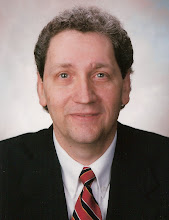Sadly, churches aren't immune from the disease. Even in the New Testament, Jesus told one church, "I wish that you were hot or cold! But you are only warm - not hot, not cold. So I am ready to spit you out of my mouth." (Revelation 3:15-16 ERV).
This First Century church had already decayed to the point that Jesus Himself found it sickening. Tragic! And if it happened as far back as the time of the apostles, it's obvious that it happens today... and has happened often throughout history.

So, what's the answer to this recurring problem?
Renewal. The kind of spiritual renewal that has periodically exposed hypocritical church leaders and brought disturbing infusions of spiritual power to the Body of Christ ever since apostolic times.
How does such renewal happen?
Well, after 27 years in the same church, I've seen it happen... several times. And I've seen our church walk a long journey from the days of stiff religiosity to becoming a loving, praying, spiritually oriented family.
I don't pretend to be an expert on group renewal, or even spiritual renewal, but I can list some milestones we've seen along the path.
1. An emphasis on prayer. We've had a regular Tuesday night prayer meeting since 1994. We now emphasize prayer in various ways, but that didn't start until after several years of classes and sermons on prayer and its place in our life as a church. We didn't know it at the time, but God was renovating our focus, our emphasis as a church. As the apostles said in Acts 6:4 after turning much of the physical ministry over to deacons, "we will give our attention to prayer and the ministry of the word."
When leaders teach, model and emphasize prayer, the church heads toward renewal.
2. A minimizing of controversies. As the apostle Paul wrote to the young preacher Timothy, he emphasized "Warn (the church) before God against quarreling about words; it is of no value and only ruins those who listen... Avoid godless chatter, because those who indulge in it will become more and more ungodly... Don't have anything to do with foolish and stupid arguments, because you know they produce quarrels. And the Lord's servant must not quarrel..." (1Timothy 2:14-26 NIV).
Churches that swim in the atmosphere of brotherhood issues, controversies and doctrinal wrangling can't grow spiritually. In fact, the Bible says you can measure spiritual growth (or the lack of it) by a church's attitude toward controversies and arguments (see 1 Corinthians 3:1-3).
3. A commitment to serious, in-context Bible study. Believers need to hear the word of life regularly. They need to hear it in context, without it being forced into some mold to fit the teacher's private interpretation. When a church emphasizes Bible study and regular Bible reading, members will grow in their faith and spiritual walk.
Churches that try to attract more people by shallow, semi-biblical junk food can't produce solid disciples. Such churches become a mile wide and an inch deep.
"Consequently, faith comes from hearing the message, and the message is heard through the word of Christ." (Romans 10:17 NIV).
4. A submission to the Holy Spirit. I know. That's controversial in many circles. But it's Biblical. In fact, if you examine the churches that find the Spirit controversial, you'll often find a distinct lack of spirituality. You'll see a church in desperate need of renewal.
Next time you read the Book of Acts underline every reference to the Holy Spirit. When I did so in the New International Version, I found Him mentioned 57 times in 28 chapters! And those references paint a picture. The Spirit was running the show. He was empowering the disciples to preach Christ in dangerous places. He was connecting preachers with prospects, sending missionaries to very specific places, forbidding them to go to other places and generally organizing and leading the church in her mission of preaching the gospel in a hostile world.
But, is what happened in Acts a guide for how the Holy Spirit wants to work in today's church? If not, why do we have the Book of Acts preserved? To give us a dry history book of what used to happen? And if Acts isn't a guidebook describing the Spirit's permanent place in the church's mission, why do the letters written to the churches also emphasize cooperation with the Holy Spirit?
In a world that's growing darker by the day, we can forget church as usual. Like the comment attributed to financial guru Warren Buffett about tough economic times, "You find out who's been swimming naked."
In the present spiritual warfare on this planet, we're finding out which churches are "swimming naked". It's time to find the the spiritual courage to submit to the kind of renewal we haven't seen since the Holy Spirit put Christ's church on the map... "And they were all filled with the Holy Spirit and spoke the word of God boldly." (Acts 4:31 NIV).


















